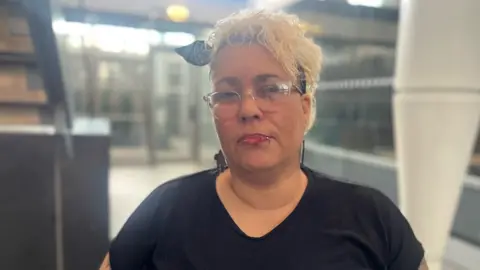Mental health: Ministers accused of making excuses
 Getty Images
Getty ImagesThe response of Labour ministers to a report calling for action on poverty to tackle mental health issues is not good enough, an advisory group has said.
Last year the Senedd's health committee found that poverty and discrimination must be tackled to deal with poor mental health.
But a group advising the committee has complained about the government's response.
Ministers said they accepted all but one of the report's 27 recommendations.
The advisory group, made up of people who have suffered mental health conditions, said the detail of the government's response seemed "like a list of excuses".
Last year the health committee said medication was sometimes used as a "sticking plaster" and underlying issues went unaddressed.
Groups it believed to be at risk of mental health inequalities included ethnic minorities and those in poverty.
The report called for "effective action" to recognise and address the impact of trauma, and tackle inequalities in society and the wider causes of poor mental health.
In response the Welsh government accepted the recommendation, saying the current strategy on tackling mental health includes a focus on supporting vulnerable groups and reducing inequalities, and said it would be a fundamental principle of its successor strategy.
The committee said participants in the advisory group "felt that the Welsh government's response to recommendation one was very brief and didn't give them confidence that reducing mental health inequalities will be a 'fundamental principle'".

Dee Dickens, 52, is a PhD student studying neurodiversity who also has autism and mental health struggles.
She said she was "gutted" with the Welsh government's response to the report because "so much work had been put in to it".
"I don't think they understood the importance of what we were asking," she said.

Lisa Hodge, 34, from Newport, who helped to set up a dyslexia network, added: "We've made quite a few great recommendations that would actually help us as neurodivergent people, but they seem to completely missed the point on most of what we've said."
Participants in the group did not agree that the Welsh government's powers to tackle poverty were so limited that it could not substantially reduce poverty levels.
"I'm so fed up with hearing 'That's for the UK government'," one said.
"Our group talked specifically about health, about housing, about homelessness and there's nothing of that in here. I refuse to believe that ending homelessness in Wales is a UK government problem."
The government accepted a recommendation calling for a "roadmap setting out actions at national and local level to improve mental health among neurodivergent people".
It set out details of a "neurodivergence improvement programme", backed by £12m of extra funding.
A participant said: "The Welsh government's response seems like a list of excuses. We specifically asked for a roadmap, a timeline, and really specific actions to be done and the response has not only not provided these roadmaps and timescales but it's also listing things that have already happened."
Neurodiversity is an umbrella term used to describe people who have conditions such as dyslexia, autism and attention deficit hyperactivity disorder.
Chairman of the Senedd's Health and Social Care Committee, Russell George, said: "Our central message is that the mental health and wellbeing of the population will not improve unless effective action is taken to tackle inequalities in society and the wider causes of poor mental health, including recognising and addressing the impact of trauma."
A Welsh government spokesman said: "Tackling mental health inequalities is a priority for us and we have accepted, or accepted in principle, all but one of the report's 27 recommendations.
"Throughout 2023 we will continue to work with key partners, including users of mental health services, to develop the successor to the Together for Mental Health strategy, building on the current strategy's aim to tackle mental health inequalities in Wales."